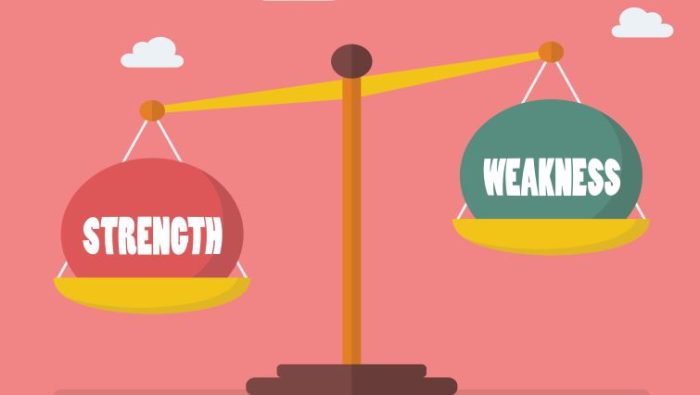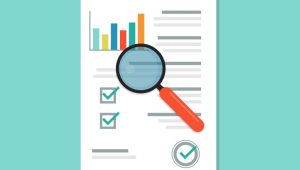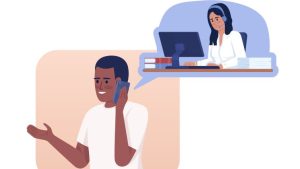5 Common Job Interview Weaknesses (And How To Turn Them Into Strengths)
 Publié le 7 July 2022
Publié le 7 July 2022
Be ready to answer the tough questions from a hiring manager by knowing 5 common job interview weaknesses (and how to turn them into strengths).
“What is your biggest weakness?”
This might be the worst question to be asked during a job interview. No one wants to discuss their weaknesses in case it immediately rules them out of contention for the job. Hiring managers, however, love this question because it presents a challenge and problem for job seekers to solve. This is why saying that you have no weaknesses would be a major mistake.
The best way to prepare for this question is by understanding 5 common job interview weaknesses (and how to turn them into strengths). By acknowledging any areas where you have experienced difficulty, it will allow you to show how you have addressed this weakness in order to become the best candidate for the job.
5 Common Job Interview Weaknesses
- You’re an introvert
- You’re too self-critical
- You can be impatient
- You’re not a morning person
- You lack experience
You’re An Introvert
Contrary to popular belief, being an introvert is not a character flaw. Shyness and associated characteristics are sometimes portrayed as personality traits which must be overcome. The truth is that being introverted or extroverted is just a simple facet of one’s personality. All it means is that, as an introvert, you find that your energy is recharged when you have time and space to yourself. This is opposed to extroverts, who draw their energy from others and can seem to thrive in social situations.
That being said, if your level of introvert tendencies start to interfere with your professional development and your personal life, it is not an ideal situation. By acknowledging that being introverted does have some benefits and potential drawbacks, it demonstrates that you have a strong understanding of where your personality type can fit into the dynamic of the workplace. It is important to be upfront about your expectations and needs in the workplace, and as it will allow managers to know that giving you space is how you are able to perform at your best.
You’re Too Self-Critical
The ability to take a critical view of your work and make an honest self-assessment can be very beneficial, and lead to improvements in your performance. There is definitely a point, however, where self-criticism can do far more harm than good. If you are too self-critical in your thinking regarding your own work performance, it will not lead to better performance or greater achievements. What is far more likely to happen is that you will become bogged down in negative self doubt, halting your professional development and causing other work problems.
The impulse to be self-critical comes from a well-intentioned place of wanting to produce the best results which are possible. During a job interview, this tells a hiring manager that you care about your job and the work that you do. The key is that you have to maintain a level of confidence in your own abilities and the work you produce. Company leaders should already have review periods and assessments built into the work schedule, and knowing that leaders are open to discussion about work performance can turn these moments of doubt into opportunities to learn and grow.
You Can Be Impatient
Impatience can be perceived as a common job interview weakness because a hiring manager could take it to mean that you rush headlong into situations. It is important to focus on the small important details of projects, not just the large goals, as a business does not want to hire somebody who will work so quickly that they miss crucial steps and overlook flaws that could have been spotted with a bit more focus.
The best way to address being impatient as a common job interview weakness is to reframe it as a positive. You are not impatient, you’re enthusiastic. You approach each task and project with energy and optimism that it can be completed efficiently and ahead of schedule. The key is to demonstrate that you can channel this energy into productive and quality work, without skipping details. In fact, it could be a sign that you are ready to move up into a more challenging role with greater responsibilities.
You’re Not A Morning Person
If you don’t love waking up when it’s still dark outside, watching the sunrise during another long commute into the office and feeling like all the coffee in the world can’t clear your head, you’re not alone. People have all different types of sleep schedules, also known as circadian rhythms. What this means is the different people function at their best at different times of the day. For some, this means they do their best work in the mornings, in the afternoon and evening for some, and even overnight for night owls. The good news is that this is nothing to do with laziness or a lack of effort, but rather it is simply biological.
During your job interview, acknowledging the reality that you do your best work later in the day is a good way to demonstrate that you have made an honest assessment of yourself as a worker. If the position you are interviewing for offers a flexible work schedule, you’d be the perfect fit, especially if they have clients and customers in different time-zones. Alternately, if you can demonstrate that you have adjusted your own work schedule to take your circadian rhythm into account — by completing tasks such as responding to emails which require less of an effort in the morning, for example — it’s proof you are willing to adapt in order to produce your best possible work for the organization.
You Lack Experience
Of the most common job interview weaknesses, a lack of experience can pose the most serious obstacle to you getting hired for your desired job role. HR managers understandably look for candidates that have relevant skills, experience and knowledge in similar job roles in order to ensure a smooth transition and onboarding process. This can be especially true in highly specialized jobs, such as tech roles that require knowledge of specific programs and applications. However, many job applicants find themselves asking how they can gain enough experience to be hired if they can’t get hired due to a lack of experience.
What’s important is that you certainly do have experience with invaluable soft skills that you will use at any job. If you can demonstrate your experience utilizing communication, leadership, organization and, perhaps most importantly, learning skills it will help turn this common job interview weakness into a positive. Strong workplaces should make continuous learning a central value for all employees, and if you show your willingness to learn and adapt to fit the evolving needs of the job role, you will help make yourself seem like an ideal job candidate to hiring managers.
The job interview is the most important part of the hiring process, and the most stressful. Through a process of open discussion and honest questions and answers, It’s your opportunity to make a solid face-to-face impression with a hiring manager and demonstrate that you are the right person for the available job. When asked about your biggest weaknesses, it’s not time to panic. By knowing 5 common job interview weaknesses (and how to turn them into strengths), you will show a hiring manager that you are prepared to face new challenges and continuously adapt on your successful career path.







